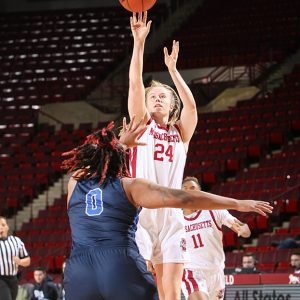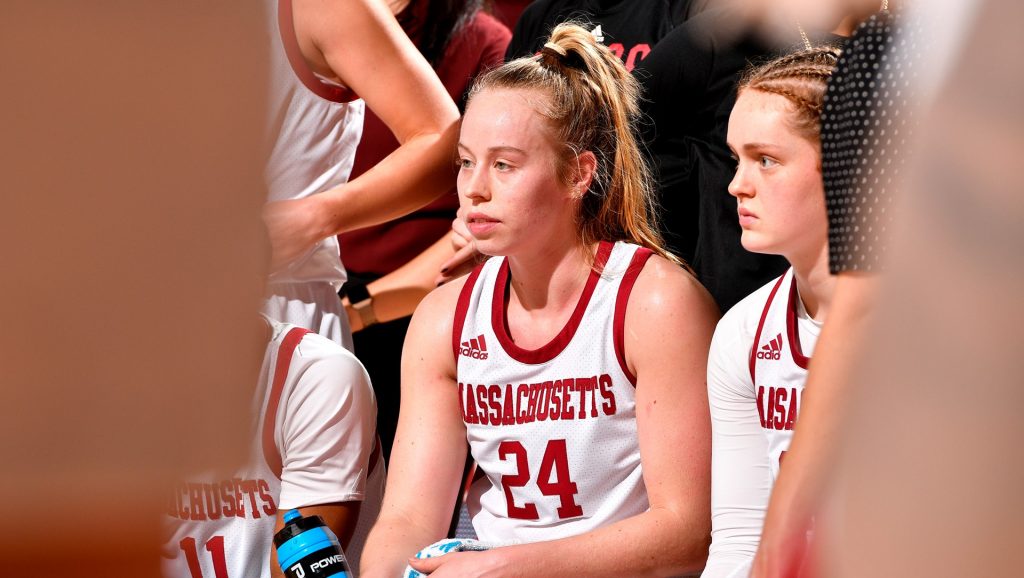Hailey Leidel answers my call from what she calls “probably the smallest apartment in Sweden.” It’s more Greenwich Village chic than Nordic; she showcases a table that folds out of the wall to save space and the small hallway that doubles as the eating area. “I don’t mind it, honestly. It feels like a home,” says Leidel, and I believe her.
It’s been almost two years since her UMass career came to a careening end. A few days after UMass blew out St. Bonaventure at the Mullins Center, the Minutewomen fell to Saint Louis in the A10 quarterfinals in Dayton. Leidel scored 11 points on the day, leaving her 17 points shy of Sue Peters’ all time UMass scoring record. At 20-11, the 2019-20 Minutewomen tied the program record for wins, and were hopeful of a CBI or WNIT bid before Covid cancelled the national postseason. Without a doubt, a postseason appearance would have given Leidel the platform to become number one.
UMass fans know Leidel as one of, if not the most prolific player in the last 15 years of the program. She’s the all-time program leader in games played, minutes played, and three-point shooting, and she’s top ten in too many categories to list. She looks back with pride, but as always has little ego. “We didn’t have too many options [early on],” she notes, “so I had opportunities from day one.”
Leidel experienced UMass in year zero. She set scoring records in her high school career in the moderately-sized town of Brownstown, Michigan, but she was only recruited by Eastern Michigan, Detroit Mercy, and Youngstown State. In her words, “not a lot of people wanted me.” UMass, while ostensibly the biggest of those schools, was in no great shakes. The Minutewomen had not finished higher than tenth in six seasons under Sharon Dawley, before Tory Verdi took over from Eastern Michigan at the start of the 2016-17 season. In Leidel’s first year, the Minutewomen went 3-13 in conference play, finishing the season on an eleven-game losing streak. “Teams wouldn’t even have shootarounds when preparing to face us,” she notes with a wry smile. “They would just show up, pass the ball a few times, and let the walk-ons play before the night was over.”
Leidel rode her A10 Rookie of the Year campaign, where she was the second-highest scoring freshman in the nation, to an immediate leadership role. She became the captain of UMass as a sophomore, a position she would hold for her final three years. “I was never really the kind of player who would, you know, yell at players on the court,” says Leidel, but her play spoke for itself. “Vash [Perry] and Jess George [who captained the team with her] would bark at you. We balanced each other out.”

It’s hard to imagine a team waltzing into the Mullins Center with that attitude now, six years after Leidel made her debut (she scored 16 points, and had nine double-figure games in her first ten games). Indeed, Leidel herself was the catalyst for a remarkable turnaround; the Minutewomen went from three A10 wins her first year to six, then seven, then nine. It wasn’t just Leidel who led this charge – she was joined by a group of players including Vashnie Perry, Destiny Philoxy, and Jess George – but she was more influential than she was willing to give herself credit for.
The first thing that changed during Leidel’s time at UMass was the expectation of community. When Leidel arrived at UMass, the players would hardly communicate with coaches outside of games. “During my time, we started having meetings with the coaches. Nowadays, I know players can get coffee with them and can spend time off the court with the staff. [Verdi] wants his teams to feel like family.”
Tory Verdi is undeniably a man with expectations – “he would let us know that a lack of effort was simply unacceptable, and he’d push us to the limit in practice,” as Leidel notes – but he imparts these foundations out of love. It is impossible to listen to Verdi talk about his team without noting the immense pride he takes in witnessing growth. It’s not uncommon for him to be moved to tears while talking about the trials and tribulations that he, his staff, and his players have faced (and, in almost every case, overcome). Those off-court expectations combined with Leidel’s on-court numbers – she once hit ten threes in a game, for example – were instrumental as the Minutewomen rebuilt.

“Hailey was an absolutely foundational piece of what we have built here at UMass,” says Verdi, after wrapping up the final practice before a rivalry match with URI. “She was a great player and exceptional leader, but her performances also gave us a story to tell to recruits. They could look to her and what she accomplished and feel that this place has stories to tell.” In many ways, Leidel was the ideal Verdi player. She hardly left the gym. She was consistently the first player on the court. She played in every single game across her career at UMass, starting 120 of 123 of them and playing 35 minutes per night. Many people, when I asked about Leidel’s impact on the program, waxed lyrical over her work effort before even touching on her numbers. One called her the hardest working player they had ever seen.
Whether the work effort supplemented the talent or vice versa, Leidel’s career is just beginning. She signed a pro contract in Luxembourg and dropped 27 points in her first game before Covid reared its almighty head. She had a four-month stint at home in Michigan, where she trained and played with the Detroit Queens in a developmental league, and also played a handful of games in Greece before the Greek government shut down the league.
I asked if she felt prepared for her professional career coming out of the A10. “You get to play some great players,” she said thoughtfully, “but it was our situation at UMass more than anything else. The defensive principles we learned, the mentality we needed to have…that was it, more than anything else.” Leidel is too humble to say it verbatim, but it’s clear that the three-year captain has continued to lead. She mentions going over old game film with teammates and helping others adapt to the explicit foreignness that many Americans experience while playing abroad, despite still being ostensibly in the dawn of her professional career.
Leadership has been in plentiful supply since Leidel’s arrival at the Mullins Center. Tory Verdi’s leadership group from his first four years at UMass include Leidel’s former co-captain Vashnie Perry, now a graduate assistant at St. John’s (where former UMass assistant Candice Walker now serves as assistant coach and recruiting coordinator), current UMass DOBO Jess George, and Jess Nelson, who still works around the program. There might not be any correlation between Verdi’s coaching dogma, with its emphasis on consistency, and the post-graduate careers of players who come through the UMass program, but the logic tracks that a coach who mandates success will produce future coaches in the same vein.

Now, Leidel plays for former WNBA first overall pick Janel McCarville at Alvik, one of Sweden’s most successful clubs. “It’s been 18 months since I became professional, but this is my real rookie year,” says Leidel with pride. She averages 13 points per game, oftentimes going against players from Power 5 backgrounds. Leidel describes taking on players with experience in the league – a former Dallas Wings point guard, players with WNBA draft pedigree – but as always, she remains unfazed. “Yeah, it’s cool to play against these players from those schools, but we’ve got D2 and D3 players who are here with us too. There are so many elite women from so many backgrounds…but we’re all here now. That’s the beauty of basketball.
Leidel’s journey from Brownstown to Amherst to Luxembourg, Greece, and Sweden has been tumultuous, but from the small apartment in western Stockholm you can see the same player who never left the gym and was first on the court to every game. “I haven’t changed much,” she says. “If I have an open shot, I’m going to take it.” Knowing Hailey Leidel, she’ll make it, too.

